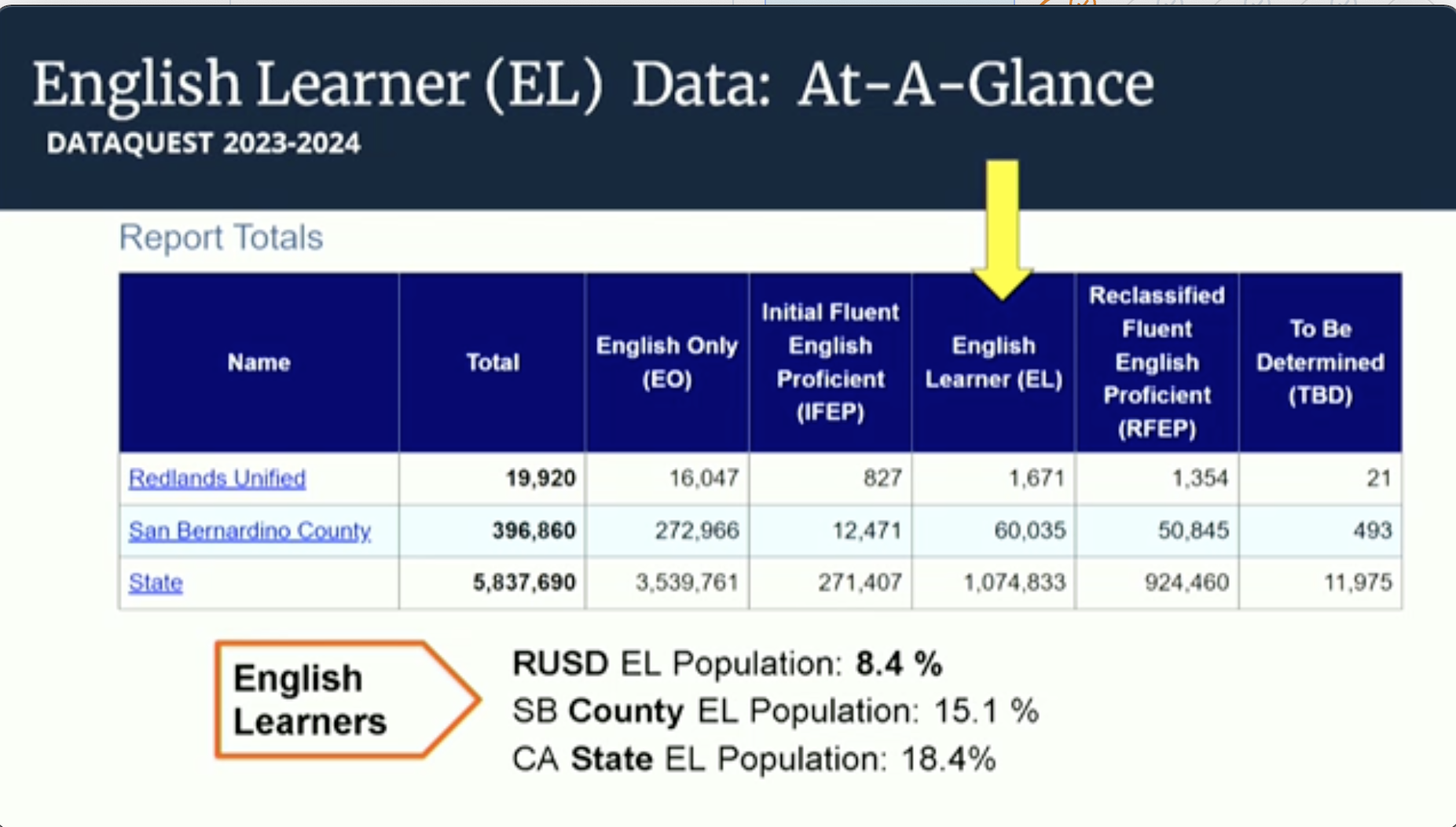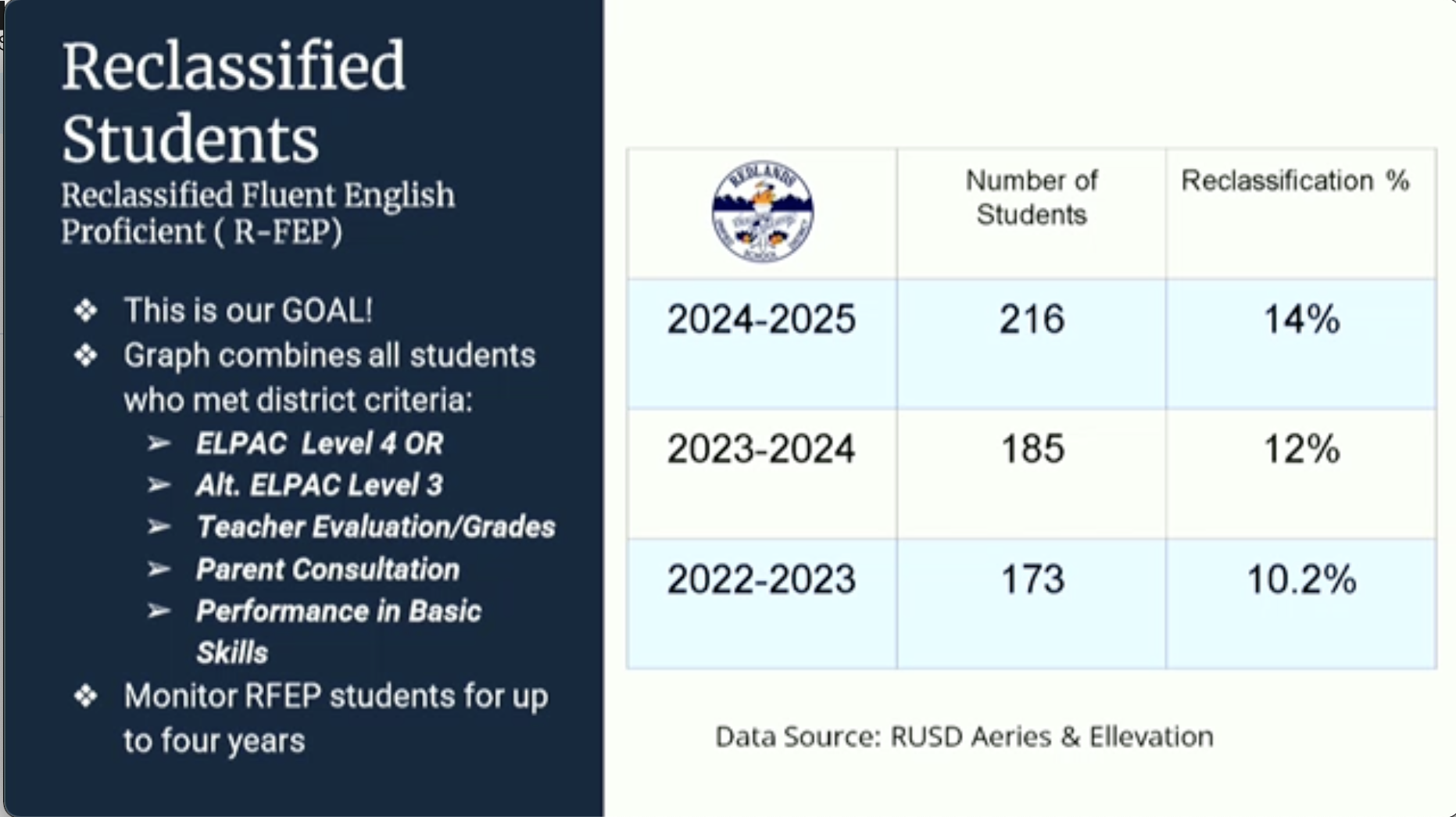RUSD serves students speaking 56 languages, committee works to support English learners
District English Learner Advisory Committee shares annual update on programs, reclassification efforts and parent involvement

REDLANDS, Calif. — The District English Learner Advisory Committee (DLAC) presented an annual update to the Redlands Unified School District (RUSD) Board of Education during their April 8 meeting, highlighting the district's efforts to support its 1,671 English learner students who represent 8.4% of the student population.
Why it matters: RUSD serves English learner students who speak 56 different languages, with Spanish, Arabic and Vietnamese being the most common, according to a presentation delivered to the board.

Details: The committee, comprised of parents, staff and community members, advises the district on programs and services for English learner students. DLAC is required by the California Department of Education for districts with 51 or more English learners.
"Our goal is for them to maintain their home language…and learn English," Director of Special Projects Sonya Balingit, explained. "Learning English is our goal."
The district has made progress in reclassifying students as Fluent English Proficient, with 216 students reclassified during the current school year, showing growth compared to previous years.
"Reclassification is open all year," Balingit noted. "We can reclassify a student at any time during the school year."

The criteria for reclassification includes achieving level 4 on the English Language Proficiency Assessments for California (ELPAC) or level 3 on the alternate ELPAC for students with extensive needs. Teacher input, grades, parent consultation and performance on basic skills assessments are also considered.
Once reclassified, students are monitored for four years to ensure continued progress. The district currently monitors over 3,000 students, including both English learners and those who have been reclassified.
DLAC meetings are held throughout the year in both virtual and in-person formats. The committee discusses a range of required topics including the district's master plan for English learners, needs assessment, program education, training, parent involvement and written notifications.
"It's very important to the state and to us that any notifications that are sent home to parents are in a language that they can understand," Balingit said.
Regarding translated materials, Balingit confirmed that while communications routinely go out in English and Spanish, the district works with a company called Album to provide translations in other languages upon request.
"We do our best to meet those 56 different languages. Sometimes it's pretty easy to do, and sometimes it takes us a little digging, but we do that very often," she said.
A needs assessment conducted in early fall helps focus the committee's work throughout the year. The assessment is divided into categories including academics, attendance and behavior, social-emotional learning and English learner programs.
In academics, parents requested homework help, reading intervention at school sites, after-school tutoring and parent workshops. For attendance and behavior, they sought better teacher-student relationships, continued rewards and incentives and workshops to help parents understand the importance of attendance.
Social-emotional support requests included assistance during state testing periods, which can be particularly challenging for English learners.
"You have to remember, they take tests back to back. Right now they're taking their ELPAC and they move right into [California Assessment of Student Performance and Progress Assessments]," Balingit explained.
Parents also appreciate transparency during school lockdowns and home visits from counselors, principals and assistant principals who get to know their home situations.
For English learner programs specifically, the committee requested teacher training, preparation for state assessments, tutoring and resources for newcomer students who are new to the country.
When asked about tutoring services, Balingit explained that these vary by school site. Some schools provide tutoring through the Expanded Learning Opportunities Program (ELOP), while others hire paraprofessionals specifically for tutoring.
Moving forward: Looking ahead, the district plans to continue updating its master plan, providing professional development, working with parents, and ensuring compliance with state requirements. Balingit also mentioned plans to "re-explore the implementation of a dual immersion program" and support reclassification efforts.
The district will also honor over 200 students who have earned the State Seal of Biliteracy in 19 different languages this year.
The next DLAC meeting is scheduled for May 14 and will be held in person. The committee will review the Local Control and Accountability Plan and provide final input, as well as discuss any potential federal and state funding opportunities.






